

Bicycling in Early Greenwood
BY: BG EDITOR
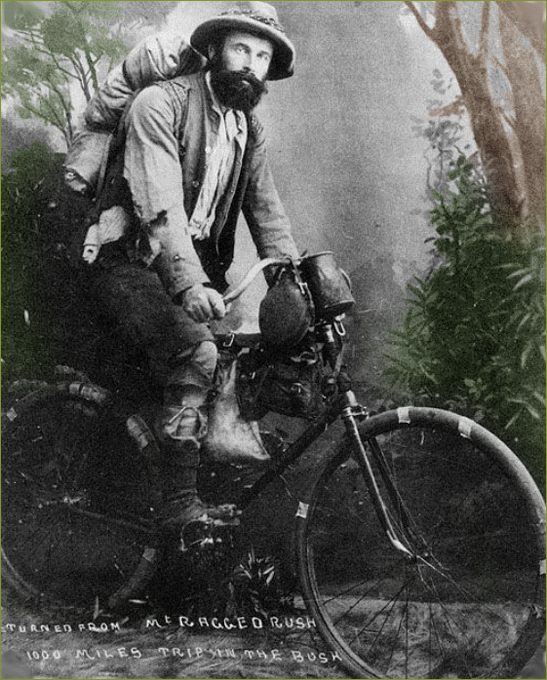
Gold miner on a long ride through the bush
[ Photo: Wiki CC 2.0 ]
Apr 27, 2019 — GREENWOOD, BC (BG)
Bicycling through the Boundary Region is a sport enjoyed by many. The city of Greenwood is fortunate to have the Trans Canada Trail run right alongside it, and an active advocacy group, Trails to the Boundary that promotes this beautiful cycling venue.
Bicycling in Greenwood had been going on since nearly 100 years before the advent of the Trans Canada Trail. In October 1896, the Boundary Creek Times reported on the excellent road conditions between Greenwood and Grand Forks; the road was smooth enough to ride a bicycle over. As early as 1897, bicycles were advertised for sale in the local paper… although one still had to go to Vancouver to make the purchase.
The popularity of bicycles was reflected in the name of a mining claim at Deadwood camp in 1898, called 'the Bicycle'. During the summer of 1897 the news reported that several salesmen had come through Greenwood on bicycles, one traveling round trip from Penticton. Although much of the roadway was very rough, bicycles were still considered a better means of transport than walking… but in some cases, perhaps only a little better:
"R. M. McEntire and Thos. McDonnell, of the firm of McEntire, McDonnell & Co. made several trips to Meyers Creek last week. They were not on pleasure bent; indeed one of the trips was taken on bicycles with the result that neither are saying much, but their appearance upon their return spoke volumes."[1]
Indeed, one Greenwood merchant warned that "A fast bicycle rider will often receive painful cuts, sprains or bruises from accidents", but his arnica salve would kill the pain.
In July 1899, a Dominion Day carnival was held in Greenwood, and along with wrestling and horse racing, there was a bicycle race on the event card. From that day, bicycle races became a very popular sport in Greenwood and were included at many festivals and church garden parties over the years. Also enjoyed were competitions for the best decorated bicycle and rider.
By 1900, the sport was so popular that Greenwood's first Bicycle Club was founded. As mentioned in our recent piece on Easter Sunday in Greenwood, in 1900 the city's new Bicycle Club took a spin out for Easter, mustering up a dozen riders who rode to Midway and back.
GREENWOOD BICYCLE CLUB
"Bicycling promises to be quite the thing in Greenwood this summer. Among the local riders of the 'silent steed' there are some who have achieved honors on the track. One of the most enthusiastic is Bert Mclntyre. Bert has to his credit some records on the tracks in the Northwest territories and is one of the workers for the success of the Greenwood Bicycle club, which was formed by a coterie of wheelmen on Friday evening.
Bennest & Eccles' store was the scene of the gathering of a dozen riders, who there and then proceeded to organize a club. The officers elected were: Ed. Birnie, president; N. Lamont, vice-president; A. W. Bennest, secretary-treasurer, and C. Erlich, captain.
Every one who rides is invited to join, and all lady bicyclists were made honorary members.
Tomorrow (Sunday) morning at 9:30 the wheelmen will hold their initial run, weather permitting. The start will be made from the B. C. hotel, and an invitation is cordially extended to both resident and visiting wheelmen to participate.
The Times begs to make one suggestion to the new club, and that is to fall in line and affiliate with the Canadian Wheelmen's Association."[2]
"Bicycling promises to be quite the thing in Greenwood this summer. Among the local riders of the 'silent steed' there are some who have achieved honors on the track. One of the most enthusiastic is Bert Mclntyre. Bert has to his credit some records on the tracks in the Northwest territories and is one of the workers for the success of the Greenwood Bicycle club, which was formed by a coterie of wheelmen on Friday evening.
Bennest & Eccles' store was the scene of the gathering of a dozen riders, who there and then proceeded to organize a club. The officers elected were: Ed. Birnie, president; N. Lamont, vice-president; A. W. Bennest, secretary-treasurer, and C. Erlich, captain.
Every one who rides is invited to join, and all lady bicyclists were made honorary members.
Tomorrow (Sunday) morning at 9:30 the wheelmen will hold their initial run, weather permitting. The start will be made from the B. C. hotel, and an invitation is cordially extended to both resident and visiting wheelmen to participate.
The Times begs to make one suggestion to the new club, and that is to fall in line and affiliate with the Canadian Wheelmen's Association."[2]
The Canadian Wheelmen's Association was an organization of bicycling enthusiasts founded in 1883. From then until 1898 the Wheelmen held annual meets in various Canadian cities, often as part of Dominion Day celebrations. Their last meet was in Winnipeg.
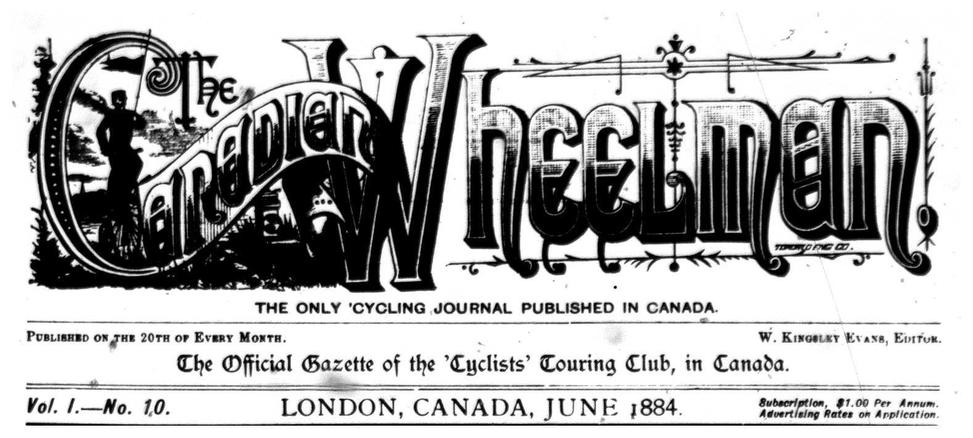
The Canadian Wheelman, 1884
[ Photo: MontrealBicycleClub.com ]
A few months after forming the Bicycle Club, Bert McIntyre met with misfortune on a different set of wheels. He and three other passengers were driving into Greenwood from Deadwood in a wagon. Just as they crossed the railroad tracks on the Smelter grounds, a wagon spring broke and all four occupants were thrown violently to the ground. While the others had various broken bones, Bert escaped with severe bruises and a scalp wound.[3]
By the following summer, Mr. McIntyre was back in good form and peddling at high speed to better his challengers. His competitive cycling activities were reported by the Times:[4]
"There is a handsome trophy in Greenwood and thereby hangs a tale. It was put up at the Nelson celebration last year in connection with the bicycle races and it was won by Bert Mclntyre of Greenwood.
The cup was to be won twice before it could become the final property of the winner. Now under the rules of bicycle racing the holder of the cup has the privilege of contesting for its ownership in his own town, but evidently the Nelson sports wished to have a string attached to the trophy. This week Mr. Mclntyre was notified that the race for the cup took place at Nelson during the Dominion Day celebration, that it was won by some Nelson man, and asking him to return it forthwith.
As this is the first intimation Mr. Mclntyre had that such a race took place or was going to take place, and consequently he was denied the privilege of contesting, the cup will be run for in Greenwood on Labor Day and all the Nelson riders will receive due notice. Mr. Mclntyre will gracefully deliver the cup if a better man wins the race, but he objects to being flim-flammed."
The cup was to be won twice before it could become the final property of the winner. Now under the rules of bicycle racing the holder of the cup has the privilege of contesting for its ownership in his own town, but evidently the Nelson sports wished to have a string attached to the trophy. This week Mr. Mclntyre was notified that the race for the cup took place at Nelson during the Dominion Day celebration, that it was won by some Nelson man, and asking him to return it forthwith.
As this is the first intimation Mr. Mclntyre had that such a race took place or was going to take place, and consequently he was denied the privilege of contesting, the cup will be run for in Greenwood on Labor Day and all the Nelson riders will receive due notice. Mr. Mclntyre will gracefully deliver the cup if a better man wins the race, but he objects to being flim-flammed."
As later reported by the Times, Mr. McIntyre did indeed win his championship cup at the September event.
By 1902, Greenwood had its own bicycle repair shop, operated by George H. Maynard, a local gun repairman and locksmith. His first shop was on the corner of Greenwood and Silver streets. Later that year he partnered up with W. H. Webb and the two opened a new bike repair and painting shop on Copper street. The partnership lasted until 1904, when Maynard returned to his solo operation.
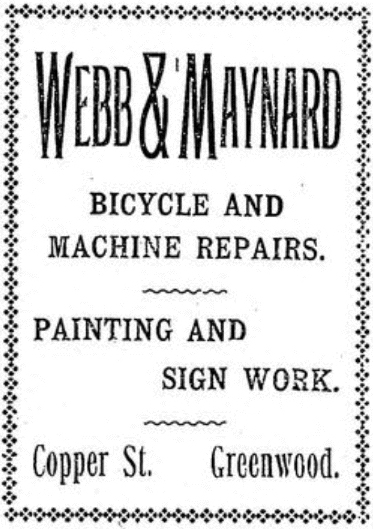
Boundary Creek Times — Nov 07, 1902
In 1904, Bert McIntyre met a sad end in what is now a ghost town in northeastern Washington:[5]
"Bert Mclntyre who was employed a few years ago by the Russell-Hardware company in this city and who was prominent in athletic and musical circles, was shot in a drunken row at Bossburg last Saturday by a man named Joe Taylor. He died from his wounds on Monday last."
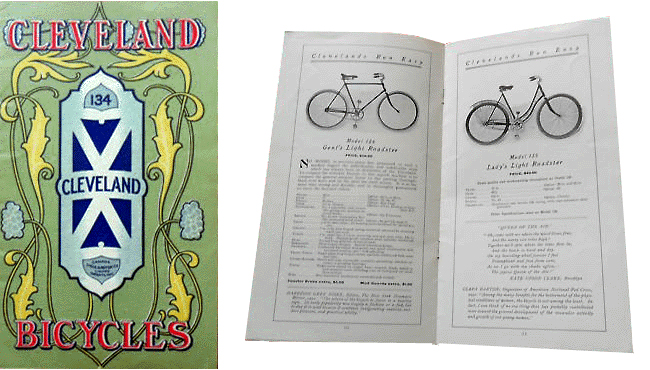
1906 Cleveland & Rambler catalog
Although Greenwood had lost its most prominent bicycle enthusiast, the sport continued on, and the bicycle continued to be used as a means of local transport. In May 1906, local mercantiler N. H. Lamont advertised the arrival of a large shipment of Cleveland and Rambler bicycles.
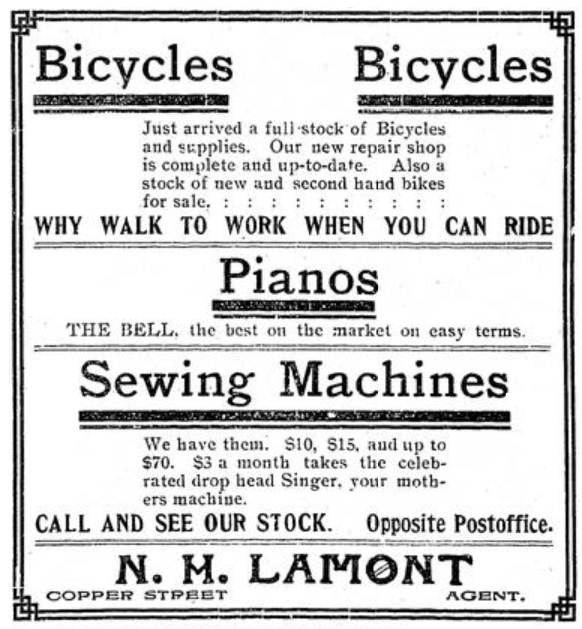
Boundary Creek Times — May 04, 1906
By 1906 the local road surfaces were much improved, but that didn't ensure smooth riding for local bicyclists:[6]
"Randolph Stuart took a holiday early in the week and went to Rock Creek. He started out on his bicycle, but had not gone far when the chain broke. After repairing this he proceeded on his journey and ran plump into a big rock in the middle of the road, pitching him headlong and smashing the wheel. He was then forced to foot it the rest of the way, arriving at Sam Larson's hotel in the small hours of Sunday morning. He tried the fishing, but with indifferent success. The big one's were not hungry and wouldn't bite. He drove home Monday night."
In 1907, keeping Greenwood streets safe for pedestrians and bicyclists was still the order of the day:[7]
"Somebody in the city's employ could with a sharp axe and a few hours work make a wonderful improvement on that part of Copper street on the flat. The rapid growth of bushes which line the street on either side is fast crowding foot passengers and bicycle riders out into the centre of the street, also tends to keep the street muddy as well."
As the first decade of the 20th Century came to a close, bicycles were a permanent fixture on local roads, as they are to this day around the world. Local services were continually available in Greenwood, keeping riders and their gear in good check. September 1909 saw the arrival of A. A. Frechette, who moved to Greenwood from Grand Forks. He opened a repair shop and rented bicycles as well.
Victorian era cyclists understood the value of their sport and the importance of cycling as a means of transportation. They were vigilant about improving the road surfaces and lessening the rigours of wheel on road. The following excerpt is from The Work of Wheelmen for Better Roads (1896) [8]
"When a man rides a bicycle he begins to study the face of the earth. The novelty of riding a vehicle of which the rider is himself the propelling power is in many ways an instructive one. The experience is delightful or dangerous; easy or irksome; inspiring or tiresome, and the pace of the rider is rapid or slow, just in proportion to the effort required to keep the vehicle in motion. And since this effort depends in a marked degree on the condition of the surface over which the bicycle is propelled, it has come to pass that the cyclist of to-day is tolerably familiar with the road question, and his familiar knowledge has been gained in that best of all schools - the school of experience.
He knows, indeed, what all the horses and all the mules knew thousands of years ago, with the added advantage of being able to tell about it. The only beast that was ever known to speak is said to have called Balsam's attention to the bad going. Every wheelman who talks for good roads tells the story that every horse would tell, and has the happy satisfaction of voicing the sentiment, not only of millions of his fellows, but of millions of dumb and patient brutes that have become galled and wind-broken and spavined and foundered and mangy in the service of millions of thoughtless and selfish masters, who, with an almost communistic fervor, are perpetually trying to dodge the road-tax. [ ]
There is really but one argument on the good roads question, and that is the argument in their favor. We all know, in the first place, that we have never had really good going. We may as well admit that these country roads are about as bad as roads can possibly be; that they are frost-laden and wet, and soft and soggy in spring and fall; dry and dusty in summer, and rough the year around. These roads are all out-doors, in plain sight; everybody knows they are bad, and every honest man will admit it. As farmers, let us admit that these bad roads keep us from town and from each other; that we can't get to market when prices are good; that we are hauling scant loads, racking our wagons, killing our horses, and rasping our tempers; that they keep our wives shut up like cattle in a pen; that they increase our solitude, keep our children from school, and send our young men to the cities with a solemn oath upon their lips that they will never till the soil. [ ]
And so the wheelmen are trying to encourage the movement for better roads, not only because good roads are needed for bicycle riding, but because they are needed by everybody. Every improvement is a herald of prosperity; every good country road increases the value of every farm that fronts it."
He knows, indeed, what all the horses and all the mules knew thousands of years ago, with the added advantage of being able to tell about it. The only beast that was ever known to speak is said to have called Balsam's attention to the bad going. Every wheelman who talks for good roads tells the story that every horse would tell, and has the happy satisfaction of voicing the sentiment, not only of millions of his fellows, but of millions of dumb and patient brutes that have become galled and wind-broken and spavined and foundered and mangy in the service of millions of thoughtless and selfish masters, who, with an almost communistic fervor, are perpetually trying to dodge the road-tax. [ ]
There is really but one argument on the good roads question, and that is the argument in their favor. We all know, in the first place, that we have never had really good going. We may as well admit that these country roads are about as bad as roads can possibly be; that they are frost-laden and wet, and soft and soggy in spring and fall; dry and dusty in summer, and rough the year around. These roads are all out-doors, in plain sight; everybody knows they are bad, and every honest man will admit it. As farmers, let us admit that these bad roads keep us from town and from each other; that we can't get to market when prices are good; that we are hauling scant loads, racking our wagons, killing our horses, and rasping our tempers; that they keep our wives shut up like cattle in a pen; that they increase our solitude, keep our children from school, and send our young men to the cities with a solemn oath upon their lips that they will never till the soil. [ ]
And so the wheelmen are trying to encourage the movement for better roads, not only because good roads are needed for bicycle riding, but because they are needed by everybody. Every improvement is a herald of prosperity; every good country road increases the value of every farm that fronts it."
We close with these lines, from Outing And The Wheelman, March 1884:
Freshets rushing,
Bridges crushing,
Stay the way of
Train and team -
What bold stranger
Braves the danger?
Who doth cross yon
Angry stream?
Rogue of metal!
Leaf and petal,
Twig and shrub on
Either side;
Wondering prattle,
As we rattle;
Tell them why so
Swift we ride.
~ S. Conant Foster (excerpted)
FOOTNOTES:
[1] Boundary Creek Times — Jul 08, 1899, p. 1
https://open.library.ubc.ca/collections/bcnewspapers/xboundarycr/items/1.0170383
[2] Greenwood Weekly Times — Apr 07, 1900, p. 4
https://open.library.ubc.ca/collections/bcnewspapers/xboundarycr/items/1.0172763
[3] Greenwood Weekly Times — Jun 02, 1900, p. 3
https://open.library.ubc.ca/collections/bcnewspapers/xboundarycr/items/1.0172760
[4] Greenwood Weekly Times — Aug 16, 1901, p. 1
https://open.library.ubc.ca/collections/bcnewspapers/xboundarycr/items/1.0172941
[5] Boundary Creek Times — Jul 29, 1904, p. 6
https://open.library.ubc.ca/collections/bcnewspapers/xboundarycr/items/1.0170882
[6] Boundary Creek Times — Aug 03, 1906, p. 5
https://open.library.ubc.ca/collections/bcnewspapers/xboundarycr/items/1.0172611
[7] Boundary Creek Times — Sep 20, 1907, p. 4
https://open.library.ubc.ca/collections/bcnewspapers/xboundarycr/items/1.0172379
[8] The Work of Wheelmen for Better Roads by Isaac B. Potter (1896)
http://www.thisvictorianlife.com/the-work-of-wheelmen-for-better-roads.html
https://open.library.ubc.ca/collections/bcnewspapers/xboundarycr/items/1.0170383
[2] Greenwood Weekly Times — Apr 07, 1900, p. 4
https://open.library.ubc.ca/collections/bcnewspapers/xboundarycr/items/1.0172763
[3] Greenwood Weekly Times — Jun 02, 1900, p. 3
https://open.library.ubc.ca/collections/bcnewspapers/xboundarycr/items/1.0172760
[4] Greenwood Weekly Times — Aug 16, 1901, p. 1
https://open.library.ubc.ca/collections/bcnewspapers/xboundarycr/items/1.0172941
[5] Boundary Creek Times — Jul 29, 1904, p. 6
https://open.library.ubc.ca/collections/bcnewspapers/xboundarycr/items/1.0170882
[6] Boundary Creek Times — Aug 03, 1906, p. 5
https://open.library.ubc.ca/collections/bcnewspapers/xboundarycr/items/1.0172611
[7] Boundary Creek Times — Sep 20, 1907, p. 4
https://open.library.ubc.ca/collections/bcnewspapers/xboundarycr/items/1.0172379
[8] The Work of Wheelmen for Better Roads by Isaac B. Potter (1896)
http://www.thisvictorianlife.com/the-work-of-wheelmen-for-better-roads.html
https://open.library.ubc.ca/collections/bcnewspapers/xboundarycr/items/1.0172760
[4] Greenwood Weekly Times — Aug 16, 1901, p. 1
https://open.library.ubc.ca/collections/bcnewspapers/xboundarycr/items/1.0172941
[5] Boundary Creek Times — Jul 29, 1904, p. 6
https://open.library.ubc.ca/collections/bcnewspapers/xboundarycr/items/1.0170882
[6] Boundary Creek Times — Aug 03, 1906, p. 5
https://open.library.ubc.ca/collections/bcnewspapers/xboundarycr/items/1.0172611
[7] Boundary Creek Times — Sep 20, 1907, p. 4
https://open.library.ubc.ca/collections/bcnewspapers/xboundarycr/items/1.0172379
[8] The Work of Wheelmen for Better Roads by Isaac B. Potter (1896)
http://www.thisvictorianlife.com/the-work-of-wheelmen-for-better-roads.html
https://open.library.ubc.ca/collections/bcnewspapers/xboundarycr/items/1.0170882
[6] Boundary Creek Times — Aug 03, 1906, p. 5
https://open.library.ubc.ca/collections/bcnewspapers/xboundarycr/items/1.0172611
[7] Boundary Creek Times — Sep 20, 1907, p. 4
https://open.library.ubc.ca/collections/bcnewspapers/xboundarycr/items/1.0172379
[8] The Work of Wheelmen for Better Roads by Isaac B. Potter (1896)
http://www.thisvictorianlife.com/the-work-of-wheelmen-for-better-roads.html
https://open.library.ubc.ca/collections/bcnewspapers/xboundarycr/items/1.0172379
[8] The Work of Wheelmen for Better Roads by Isaac B. Potter (1896)
http://www.thisvictorianlife.com/the-work-of-wheelmen-for-better-roads.html


